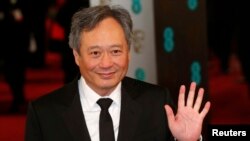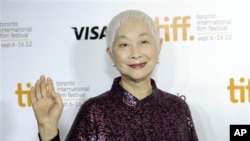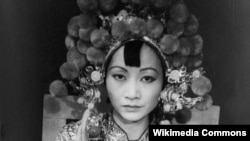Like many Asian-Americans in Hollywood's film industry, Taiwanese-born American film director Ang Lee struggled for acceptance early in his career.
This year, the Oscar-winning Lee is again a nominee for an Academy Award for Best Director for his film Life of Pi.
The movie is the highest grossing among the nine nominated for Best Picture, generating more than $570 million in ticket sales, many from audiences outside the United States.
But Lee's rise to fame didn't come overnight. Veteran Chinese-born actress Lisa Lu recalls Lee's struggle for recognition when he was a film student at New York University in the early 1980’s.
“He asked me to see his thesis film, and when I looked at the film, I knew he was very talented,” Lu said. “So from there on, we became very good friends, and I tried to introduce him to everybody, but the timing was too early. At that time nobody wanted anything Chinese.”
Lee went on to international success directing films including Crouching Tiger, Hidden Dragon, and Brokeback Mountain, for which he won an Academy Award as Best Director in 2005.
Lu played a cameo role in Lee's 2007 thriller Lust Caution, a part he developed for her.
“I’m very proud of him, because he struggled for 10 years before anybody recognized him, and he’s really a talent and really devoted to filmmaking,” Lu said.
Lu’s own career has evolved over several decades. Born in Beijing in 1927, she moved to California in 1956. Lu became the first Chinese-born star to work in Hollywood in major motion pictures and television, including the television shows Have Gun-Will Travel and Yancy Derringer. She also starred in the war film The Mountain Road opposite James Stewart.
“In 1959, Columbia (Pictures) was looking for a leading lady, Chinese, educated,” Lu recalls. “This was not like the roles before that were for coolies [unskilled laborers]. This was for an educated lady from Radcliffe [part of Harvard University].”
The film was shot in Arizona. “In those days we could not go to China and the background of the story was war-time Chengdu,” Lu said. “In Chengdu, the scenery is very similar to Phoenix, and we went to the nearby mountains to film it.”
Roles for Chinese actresses in the 1950’s were limited, according to Lu.
“At that time, there was no communication, so the writers didn’t know what China was like,” she said. “So they wrote about laborers or washerwomen or a dragon lady who has a restaurant.”
And why are Asian actresses often stereotyped as dragon ladies? “I think for television it’s interesting, because you see a very gorgeous woman who has a scheming mind and it’s an interesting character for the drama, that’s why I think a lot of people write about it,” Lu said. “It’s exotic, and I’ve played quite a few of those.”
Hollywood’s most prominent Chinese American actress was Anna May Wong, who starred in films in the 1920’s and 1930’s. Her pictures include Shanghai Express and Daughter of the Dragon.
Writer Lisa See’s Chinese American family was acquainted with Wong, but the actress and the future author never met. Wong is a character in two of See’s books, Shanghai Girls and On Gold Mountain.
See said her grandparents lent Chinese furniture and other artifacts from their antique shop to the film studios, and her grandfather was one of Wong’s closest friends. “My dad, when he was a teenager, used to go over to her apartment, and they would drink and play poker, and I now have in my closet some of her clothes,” she said.
See spoke of Wong’s roots in the city. “She was born here in Los Angeles, she grew up here, her father was a laundryman, she started working when she was about 13 years old,” said See. “I think you can look back at those films and see now she had really pretty extraordinary talent.”
But the U.S. film industry’s Motion Picture Production Code, which forbade the depiction of romance between races, limited Wong’s acting career. “She wasn’t ever allowed to kiss the hero, it just was never going to happen,” said See. “And eventually she went to Europe, where she was able to have a larger career.”
See believes the hardest blow for Wong occurred when she was barred from playing the lead role of O-lan in the 1937 film version of Pearl Buck’s novel The Good Earth. It tells the story of a Chinese farming family struggling with famine, poverty and betrayal. The film was cast with non-Asian actors in the leading roles, a decision that See said “broke [Wong’s] heart.”
Wong was cast in the 1961 film Flower Drum Song, about a Chinese American family in San Francisco, but she died at the age of 56 before making the movie. Her films and image continue to influence Asian American actors and filmmakers.
For her part, Lu went on to star in character roles, notably as the dying Empress Dowager Cixi in The Last Emperor in 1987. She lobbied director Bernardo Bertolucci for the part, but he told her he needed an older actress. “I told him you don’t need an old lady, you need a good actress,” she said. “I’m ready to make a test film for you and I said if you think I can do it then your problem is solved.” She got the role.
Lu regularly returns to China to shoot films and to attend premieres, such as the opening of Dangerous Liaisons in Beijing last September. This Chinese-language version of the classic 18th-century French tale is set in Shanghai of 1931, when the city was known as the “Paris of the East.”
Lu looks forward to greater cooperation between the film industries of China and the United States in the future.
“Everybody wants to come to Hollywood, but I think nowadays with the Internet and the communications that no matter where you are, if you are talented, you will be found,” she said. “So I think that China would need actors from Hollywood and Hollywood would need actors from China.”
This year, the Oscar-winning Lee is again a nominee for an Academy Award for Best Director for his film Life of Pi.
The movie is the highest grossing among the nine nominated for Best Picture, generating more than $570 million in ticket sales, many from audiences outside the United States.
But Lee's rise to fame didn't come overnight. Veteran Chinese-born actress Lisa Lu recalls Lee's struggle for recognition when he was a film student at New York University in the early 1980’s.
“He asked me to see his thesis film, and when I looked at the film, I knew he was very talented,” Lu said. “So from there on, we became very good friends, and I tried to introduce him to everybody, but the timing was too early. At that time nobody wanted anything Chinese.”
Lee went on to international success directing films including Crouching Tiger, Hidden Dragon, and Brokeback Mountain, for which he won an Academy Award as Best Director in 2005.
Lu played a cameo role in Lee's 2007 thriller Lust Caution, a part he developed for her.
“I’m very proud of him, because he struggled for 10 years before anybody recognized him, and he’s really a talent and really devoted to filmmaking,” Lu said.
Lu’s own career has evolved over several decades. Born in Beijing in 1927, she moved to California in 1956. Lu became the first Chinese-born star to work in Hollywood in major motion pictures and television, including the television shows Have Gun-Will Travel and Yancy Derringer. She also starred in the war film The Mountain Road opposite James Stewart.
“In 1959, Columbia (Pictures) was looking for a leading lady, Chinese, educated,” Lu recalls. “This was not like the roles before that were for coolies [unskilled laborers]. This was for an educated lady from Radcliffe [part of Harvard University].”
The film was shot in Arizona. “In those days we could not go to China and the background of the story was war-time Chengdu,” Lu said. “In Chengdu, the scenery is very similar to Phoenix, and we went to the nearby mountains to film it.”
Roles for Chinese actresses in the 1950’s were limited, according to Lu.
“At that time, there was no communication, so the writers didn’t know what China was like,” she said. “So they wrote about laborers or washerwomen or a dragon lady who has a restaurant.”
And why are Asian actresses often stereotyped as dragon ladies? “I think for television it’s interesting, because you see a very gorgeous woman who has a scheming mind and it’s an interesting character for the drama, that’s why I think a lot of people write about it,” Lu said. “It’s exotic, and I’ve played quite a few of those.”
Hollywood’s most prominent Chinese American actress was Anna May Wong, who starred in films in the 1920’s and 1930’s. Her pictures include Shanghai Express and Daughter of the Dragon.
Writer Lisa See’s Chinese American family was acquainted with Wong, but the actress and the future author never met. Wong is a character in two of See’s books, Shanghai Girls and On Gold Mountain.
See said her grandparents lent Chinese furniture and other artifacts from their antique shop to the film studios, and her grandfather was one of Wong’s closest friends. “My dad, when he was a teenager, used to go over to her apartment, and they would drink and play poker, and I now have in my closet some of her clothes,” she said.
See spoke of Wong’s roots in the city. “She was born here in Los Angeles, she grew up here, her father was a laundryman, she started working when she was about 13 years old,” said See. “I think you can look back at those films and see now she had really pretty extraordinary talent.”
But the U.S. film industry’s Motion Picture Production Code, which forbade the depiction of romance between races, limited Wong’s acting career. “She wasn’t ever allowed to kiss the hero, it just was never going to happen,” said See. “And eventually she went to Europe, where she was able to have a larger career.”
See believes the hardest blow for Wong occurred when she was barred from playing the lead role of O-lan in the 1937 film version of Pearl Buck’s novel The Good Earth. It tells the story of a Chinese farming family struggling with famine, poverty and betrayal. The film was cast with non-Asian actors in the leading roles, a decision that See said “broke [Wong’s] heart.”
Wong was cast in the 1961 film Flower Drum Song, about a Chinese American family in San Francisco, but she died at the age of 56 before making the movie. Her films and image continue to influence Asian American actors and filmmakers.
For her part, Lu went on to star in character roles, notably as the dying Empress Dowager Cixi in The Last Emperor in 1987. She lobbied director Bernardo Bertolucci for the part, but he told her he needed an older actress. “I told him you don’t need an old lady, you need a good actress,” she said. “I’m ready to make a test film for you and I said if you think I can do it then your problem is solved.” She got the role.
Lu regularly returns to China to shoot films and to attend premieres, such as the opening of Dangerous Liaisons in Beijing last September. This Chinese-language version of the classic 18th-century French tale is set in Shanghai of 1931, when the city was known as the “Paris of the East.”
Lu looks forward to greater cooperation between the film industries of China and the United States in the future.
“Everybody wants to come to Hollywood, but I think nowadays with the Internet and the communications that no matter where you are, if you are talented, you will be found,” she said. “So I think that China would need actors from Hollywood and Hollywood would need actors from China.”






